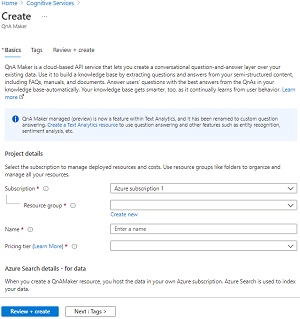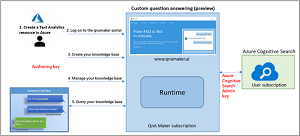News
Azure SDK: Goodbye QnA Maker, Hello AI 'Question Answering'
The regular monthly update to Microsoft's Azure SDK improves Cognitive Services text analytics, specifically with a new Question Answering SDK that supplants QnA Maker.
Azure Cognitive Services provides artificial intelligence APIs for developers to leverage AI without having expertise in machine learning.
In the August 2021 release of the Azure SDK, such developers can now try out an initial v1.0 preview release of Question Answering for .NET and Python. The Question Answering SDK is the evolution of QnA Maker, which emerged in public preview as a managed service in November 2020.
 [Click on image for larger view.] Question Answering (source: Microsoft).
[Click on image for larger view.] Question Answering (source: Microsoft).
Here's how Microsoft described QnA Maker:
QnAMaker is a Cognitive Service tool that uses your existing content to build and train a simple question and answer bot that responds to users in a natural, conversational way. QnA Maker ingests FAQ URLs, structured documents, and product manuals, extracts all possible question and answer pairs from the content.
QnA Maker is a cloud-based API service that lets you create a conversational question-and-answer layer over your existing data. Use it to build a knowledge base by extracting questions and answers from your semi-structured content, including FAQs, manuals, and documents. Answer users’ questions with the best answers from the QnAs in your knowledge base -- automatically. Your knowledge base gets smarter, too, as it continually learns from user behavior.
In May, Microsoft announced QnA Maker had been renamed to "custom question answering" and moved to the Text Analytics section of Cognitive Services.
The initial preview release of the Question Answering SDK includes support for asking questions of knowledge bases and text records, Microsoft said this week.
 [Click on image for larger view.] Question Answering Workflow (source: Microsoft).
[Click on image for larger view.] Question Answering Workflow (source: Microsoft).
The Question Answering preview feature was detailed further in May, with Microsoft saying: "The new, standard Question Answering feature will try to find the relevant answer for a user question, from a given passage of text such as a document returned as a search result, standalone web page, etc."
- Input: passage/document text and question text.
- Output: answer from the passage/doc text
"This functionality is provided as an API and can be used without having to learn the details about QnA Maker," Microsoft continued. "We currently support the ability to pass text from up to five documents."
Other things to note (as of the May announcement) include:
- All existing QnA Maker managed (preview) resources continue to work as before. There is no action required for these resources at this time.
- The creation flow for Custom question answering (preview) is the primary change. The service, portal, endpoints, SDK, etc. remain as before.
- Custom question answering (preview) continues to be offered as a free public preview. This feature is only available as part of Text Analytics Standard resources. Do not change your pricing tier for Text Analytics resources to free.
- Custom question answering (preview) is available in the following regions:
- South Central US
- North Europe
- Australia East.
The feature is expected to become generally available before year's end.
In addition to Question Answering, other new releases in the August update included:
-
Azure Communication Network Traversal for JavaScript and Python (version 1.0)
- Initial preview release.
- Adds
CommunicationRelayClient.get_relay_configuration in preview.
- Azure Cosmos DB Encryption for Java (version 4.18)
A full list of changes, release notes and associated links can be found in the announcement.
About the Author
David Ramel is an editor and writer at Converge 360.